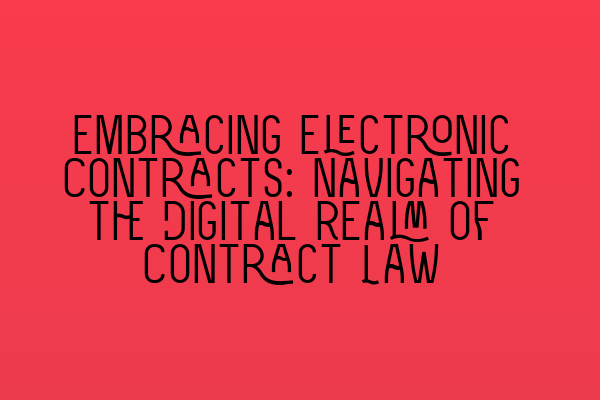Embracing Electronic Contracts: Navigating the Digital Realm of Contract Law
In today’s fast-paced and interconnected world, it comes as no surprise that traditional paper-based contracts are being replaced by their electronic counterparts. The rise of electronic contracts has revolutionized the way we enter into legal agreements. Whether you are a business owner, a consultant, or simply an individual looking to engage in a transaction, understanding the intricacies of electronic contracts is of paramount importance.
Electronic contracts, also known as e-contracts, are legally enforceable agreements that are created, signed, and stored electronically. They offer countless benefits, such as speed, convenience, and cost-effectiveness. With just a few clicks, parties can enter into agreements without the need for physical meetings or paper documents. However, navigating the digital realm of contract law can be challenging without proper knowledge and guidance.
This blog post aims to provide a comprehensive overview of electronic contracts and equip you with the knowledge necessary to navigate this digital landscape effectively. We will explore the legal requirements, advantages, and potential pitfalls of e-contracts, as well as provide practical tips for their successful implementation.
Legal Requirements for Electronic Contracts:
Electronic contracts are subject to the same legal principles as traditional paper contracts. For an e-contract to be valid and enforceable, certain essential elements must be met. These elements include offer and acceptance, consideration, legal capacity, and mutual intent. Additionally, parties must ensure compliance with relevant legislation, such as the Electronic Communications Act (2000) in the United Kingdom.
Advantages of Electronic Contracts:
1. Speed and Efficiency: Electronic contracts streamline the contract formation process, allowing parties to negotiate and finalize agreements quickly. With the ability to send and receive contracts instantly, businesses can accelerate their operations and capitalize on time-sensitive opportunities.
2. Cost-Effectiveness: By eliminating the need for physical documents and postage, e-contracts significantly reduce administrative costs. Parties can save on printing, storage, and transportation fees, enabling them to allocate resources more efficiently.
3. Enhanced Security: Electronic contracts offer robust security measures, such as encryption and digital signatures, to protect against fraud and unauthorized access. These measures provide greater certainty and confidence in the validity and integrity of electronic agreements.
4. Global Accessibility: The digital realm knows no geographical boundaries. With electronic contracts, parties can collaborate and enter into agreements regardless of their physical location. This opens doors to international opportunities and markets.
Potential Pitfalls of Electronic Contracts:
1. Technical Challenges: While electronic contracts offer numerous advantages, they are not without challenges. Technical issues, such as network failures, power outages, or software glitches, can disrupt the contract formation process. Parties must be mindful of these risks and have contingency plans in place.
2. Authenticity Concerns: In an increasingly interconnected world, verifying the authenticity of electronic contracts becomes crucial. Parties should implement robust authentication processes and digital signature technology to mitigate the risk of tampering or forgery.
3. Jurisdictional Differences: The digital realm transcends traditional borders, creating complications when it comes to determining the applicable law and jurisdiction for electronic contracts. Parties must consider the governing law and include appropriate choice of law provisions in their agreements to address potential conflicts.
Practical Tips for Implementing Electronic Contracts:
1. Seek Professional Advice: The complexities of contract law can be overwhelming, especially in the digital realm. It is advisable to consult a qualified solicitor with expertise in electronic contracts to ensure compliance with applicable legislation and minimize legal risks.
2. Keep Documentation: Although electronic contracts eliminate the need for physical documents, it is essential to keep detailed records of all electronic communications and agreements. This documentation will serve as evidence in case of disputes or legal challenges.
3. Understand the Technology: Stay informed about the latest technological advancements and trends in electronic contract management. Familiarize yourself with digital signature platforms, encryption methods, and other tools that can enhance the security and efficiency of your electronic contracts.
Embracing electronic contracts has become an undeniable reality in today’s digital age. As the world becomes increasingly interconnected, it is essential to adapt to new ways of conducting business and entering into legal agreements. By understanding the legal requirements, advantages, and potential pitfalls of e-contracts, you can harness their power to drive your business forward.
For more information on contract law and becoming a solicitor, check out these related articles:
– Securing Training Contracts: A Roadmap to Becoming a Solicitor: Learn about the steps and strategies for securing training contracts on your journey to becoming a solicitor.
– Mentorship for Aspiring Solicitors: Nurturing Talent in the Legal Field: Discover the importance of mentorship in the legal profession and how it can help aspiring solicitors thrive.
– Legal Challenges and Pitfalls: Navigating the Complexities of the Legal System: Explore the common legal challenges and pitfalls that individuals and businesses may encounter and how to navigate them successfully.
– The GDL (Graduate Diploma in Law): A Pathway to Becoming a Solicitor: Learn about the Graduate Diploma in Law program and its role as a pathway for non-law graduates to enter the legal profession.
– Mastering the Solicitor’s Path: Prepare for the Journey Ahead: Get valuable insights and guidance on the journey to becoming a solicitor and how to prepare for the challenges ahead.
In conclusion, electronic contracts offer a plethora of benefits to businesses and individuals alike. By understanding and embracing the digital realm of contract law, you can harness its power to streamline your operations, enhance efficiency, and unlock new opportunities. Stay informed, seek professional advice, and implement best practices to navigate the digital landscape with confidence.
